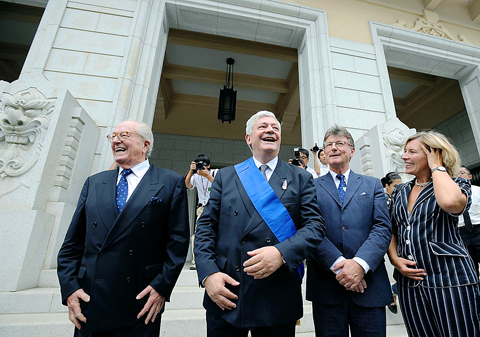French nationalist Jean-Marie Le Pen and other European right-wing politicians paid a visit yesterday to a Japanese shrine that has drawn outrage for honoring war criminals.
Le Pen, leader of the far-right French National Front and Adam Walker of the British National Party said they were making the visit, which comes a day ahead of the 65th anniversary of the end of World War II, to pay respect to those who died in war.
“What counts is the will that we had to honor those who have fallen for defending their country, whether they are Japanese, or any soldiers of the world, we have the same respect for them,” Le Pen told reporters.

PHOTO: EPA
Le Pen is known for his anti-immigrant and extremist views. He shocked France when he qualified for the second round of the 2002 presidential race, which Jacques Chirac eventually won.
The visit to Yasukuni, an ornate Shinto shrine in downtown Tokyo, was arranged by the International Conference of Patriotic Organisations, which brought together right-wing parties from eight European countries with members of a Japanese ultranationalist group called the Issuikai.
Yasukuni honors Japan’s war dead, including convicted war criminals. Pacifists and victims of Japanese aggression, such as China and the Koreas, say it glorifies Japan’s past militarism.
The visit by Le Pen and others may also anger some former prisoners of war in those countries being represented by the right-wing groups.
Tens of thousands of British, Dutch and other European soldiers and civilians were captured by the Japanese Imperial Army as it swept across Europe’s former Asian colonies at the beginning of World War II. Thousands were executed, tortured and starved to death in Japanese prisoner-of-war camps.
When asked about his visit, Walker said: “I’m honoring the dead. I am here to honor the dead — heroes that have died for their country.”
In the past, visits to Yasukuni by Japanese politicians have provoked outrage from China, South Korea and neighboring Asian countries.
Some lawmakers, as well as hundreds of regular Japanese whose relatives and friends died as soldiers in World War II, are expected to visit Yasukuni today to mark the end of World War II.
However, Japanese Prime Minister Naoto Kan and his ministers are expected to shun the visit — the first time all members of a Japanese Cabinet will stay away.
Kan’s liberal Democratic Party defeated the long-reigning conservative Liberal Democrats for the first time in decades in last year’s parliamentary elections.
Earlier this week, Kan apologized to South Korea for its colonial rule and the suffering Japan caused the Korean people, and expressed hopes for a partnership.
Japanese leaders have repeatedly apologized for wartime aggression against its Asian neighbors, including a 1995 apology from a leftist-leaning prime minister that marked the 50th anniversary of the end of World War II.

The Ministry of the Interior (MOI) is to tighten rules for candidates running for public office, requiring them to declare that they do not hold a Chinese household registration or passport, and that they possess no other foreign citizenship. The requirement was set out in a draft amendment to the Enforcement Rules of the Public Officials Election and Recall Act (公職人員選舉罷免法 ) released by the ministry on Thursday. Under the proposal, candidates would need to make the declaration when submitting their registration forms, which would be published in the official election bulletin. The move follows the removal of several elected officials who were

FOUR DESIGNATED AREAS: Notices were issued for live-fire exercises in waters south and northwest of Penghu, northeast of Keelung and west of Kaohsiung, they said The military is planning three major annual exercises across the army, navy and air force this month, with the navy’s “Hai Chiang” (海強, “Sea Strong”) drills running from today through Friday, the Ministry of National Defense said yesterday. The Hai Chiang exercise, which is to take place in waters surrounding Taiwan, would feature P-3C Orion maritime patrol aircraft and S-70C anti-submarine helicopters, the ministry said, adding that the drills aim to bolster the nation’s offshore defensive capabilities. China has intensified military and psychological pressure against Taiwan, repeatedly sending warplanes and vessels into areas near the nation’s air defense identification zone and across

FORCED LABOR: A US court listed three Taiwanese and nine firms based in Taiwan in its indictment, with eight of the companies registered at the same address Nine companies registered in Taiwan, as well as three Taiwanese, on Tuesday were named by the US Department of the Treasury’s Office of Foreign Assets Control (OFAC) as Specially Designated Nationals (SDNs) as a result of a US federal court indictment. The indictment unsealed at the federal court in Brooklyn, New York, said that Chen Zhi (陳志), a dual Cambodian-British national, is being indicted for fraud conspiracy, money laundering and overseeing Prince Holding Group’s forced-labor scam camps in Cambodia. At its peak, the company allegedly made US$30 million per day, court documents showed. The US government has seized Chen’s noncustodial wallet, which contains

SENATE RECOMMENDATION: The National Defense Authorization Act encourages the US secretary of defense to invite Taiwan’s navy to participate in the exercises in Hawaii The US Senate on Thursday last week passed the National Defense Authorization Act (NDAA) for Fiscal Year 2026, which strongly encourages the US secretary of defense to invite Taiwan’s naval forces to participate in the Rim of the Pacific (RIMPAC) exercise, as well as allocating military aid of US$1 billion for Taiwan. The bill, which authorizes appropriations for the military activities of the US Department of Defense, military construction and other purposes, passed with 77 votes in support and 20 against. While the NDAA authorizes about US$925 billion of defense spending, the Central News Agency yesterday reported that an aide of US